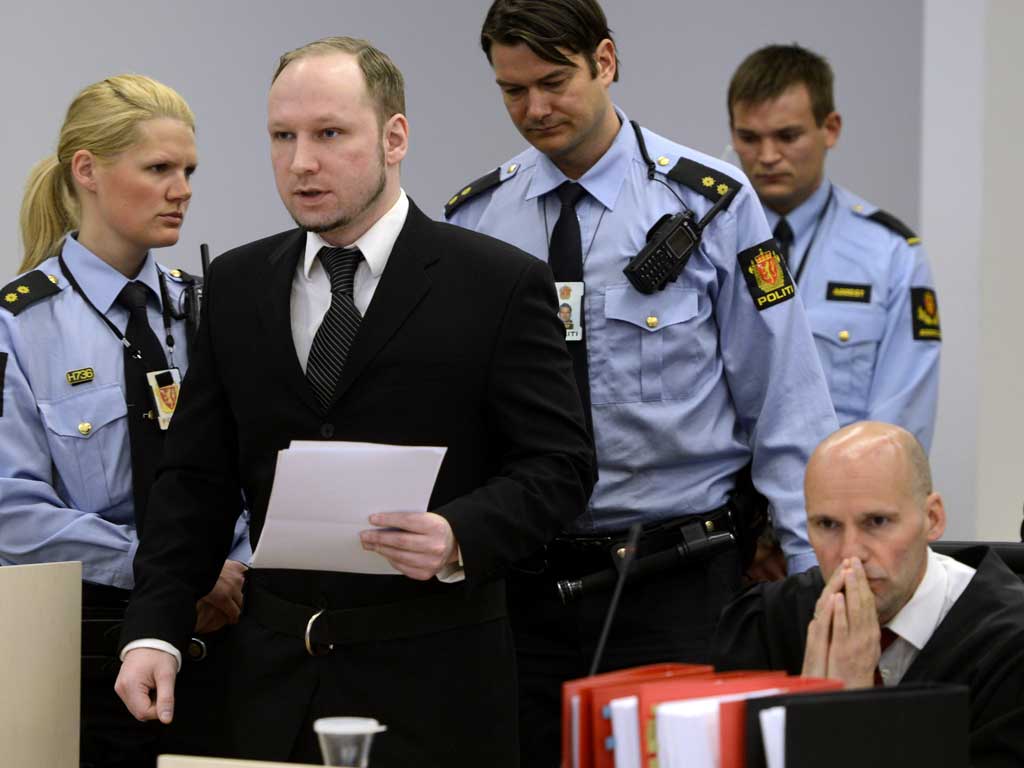Your support helps us to tell the story
From reproductive rights to climate change to Big Tech, The Independent is on the ground when the story is developing. Whether it's investigating the financials of Elon Musk's pro-Trump PAC or producing our latest documentary, 'The A Word', which shines a light on the American women fighting for reproductive rights, we know how important it is to parse out the facts from the messaging.
At such a critical moment in US history, we need reporters on the ground. Your donation allows us to keep sending journalists to speak to both sides of the story.
The Independent is trusted by Americans across the entire political spectrum. And unlike many other quality news outlets, we choose not to lock Americans out of our reporting and analysis with paywalls. We believe quality journalism should be available to everyone, paid for by those who can afford it.
Your support makes all the difference.Prosecutors pressed mass killer Anders Breivik for details about the anti-Muslim militant group he claims to belong to on the third day of his trial for the massacre of 77 people.
An irritated Breivik repeatedly refused to answer questions about who the other members of the network are, or to give details of the meetings he claims to have had with them.
Prosecutors have said they do not believe Breivik's so-called "Knights Templar" group exists.
Breivik insists it does, and said police just had not done a good enough job in uncovering it.
The issue is of key importance in determining Breivik's sanity, and whether he is sent to prison or compulsory psychiatric care for the July 22 bomb and shooting massacre.
Breivik claims to have carried out the attacks on behalf of the organisation, which he describes as a militant nationalist group fighting a Muslim colonisation of Europe.
Prosecutor Inga Bejer Engh pressed the 33-year-old Norwegian about details on the group, its members and its meetings. Breivik claimed to have met a Serb "war hero" living in exile during a trip to Liberia in 2001, but he refused to identify him.
"What is it you're getting at?" Breivik told the prosecutor, then answering the question himself, saying prosecutors want to "sow doubt over whether the KT network exists."
The main point of his defence is to avoid an insanity ruling, which would deflate his political arguments.
One psychiatric evaluation found him psychotic and "delusional," while another found him mentally competent to be sent to prison.
If found mentally sane, Breivik could face a maximum 21-year prison sentence or an alternate custody arrangement that would keep him locked up as long as he is considered a menace to society.
If declared insane he would be committed to psychiatric care for as long as he is considered ill.
Breivik admits he set off a bomb outside the government headquarters in Oslo, killing eight, then drove to Utoya island outside the capital and massacred 69 people in a shooting spree at the governing Labor Party's youth summer camp on Utoya island. On Tuesday he boasted that it was the most "spectacular" attack by a nationalist militant since the Second World War.
He said his victims - mostly teenagers - were not innocent but legitimate targets because they were representatives of a "multiculturalist" regime he claims is deconstructing Norway's national identity by allowing immigration.
Breivik also refused to give details on what he claims was the founding session of the "Knights Templar" in London in 2002. He conceded, however, that he embellished somewhat in the manifesto when he described the other three members at the founding session as "brilliant political and military tacticians of Europe."
Breivik testified that he had used "pompous" language and described them instead as "four people with great integrity."
Bejer Engh challenged him on whether the meeting had taken place at all.
"Yes, there was a meeting in London," Breivik insisted.
"It's not something you have made up?" Ms Engh countered.
"I haven't made up anything. What is in the compendium is correct," he said.
Later, he answered with more nuance.
"There is nothing that is made up, but you have to see what is written in a context. It is a glorification of certain ideals," Breivik said.
Subscribe to Independent Premium to bookmark this article
Want to bookmark your favourite articles and stories to read or reference later? Start your Independent Premium subscription today.

Join our commenting forum
Join thought-provoking conversations, follow other Independent readers and see their replies
Comments